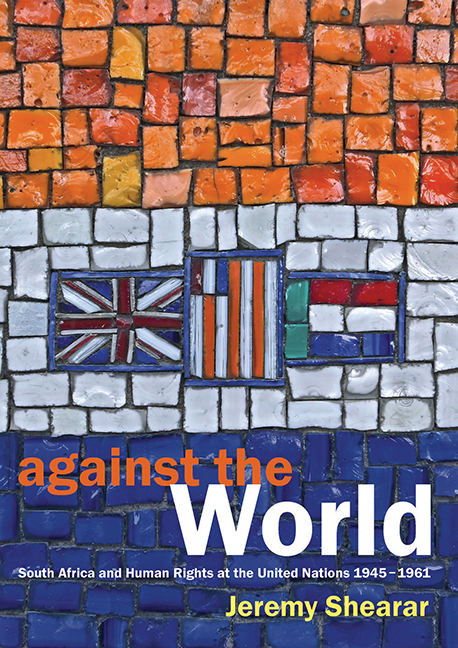Book contents
- Frontmatter
- Contents
- Acknowledgements
- Abbreviations
- Introduction: ‘What we have lost is all the more reason for cherishing what survives’
- 1 Quod severis metes: Birth of the United Nations
- Chapter 2 South African Indians
- 3 Universal Declaration of Human Rights
- 4 International covenants on human rights
- 5 United Nations surveys of human rights issues
- 6 Evolution of human rights at the United Nations
- 7 State sovereignty at issue
- 8 Apartheid on the agenda
- 9 Shadow of Sharpeville
- 10 General relations with the United Nations
- 11 Concluding observations
- Appendix: Selected provisions of the United Nations Charter
- Sources and references
- Index
Chapter 2 - South African Indians
Published online by Cambridge University Press: 19 March 2020
- Frontmatter
- Contents
- Acknowledgements
- Abbreviations
- Introduction: ‘What we have lost is all the more reason for cherishing what survives’
- 1 Quod severis metes: Birth of the United Nations
- Chapter 2 South African Indians
- 3 Universal Declaration of Human Rights
- 4 International covenants on human rights
- 5 United Nations surveys of human rights issues
- 6 Evolution of human rights at the United Nations
- 7 State sovereignty at issue
- 8 Apartheid on the agenda
- 9 Shadow of Sharpeville
- 10 General relations with the United Nations
- 11 Concluding observations
- Appendix: Selected provisions of the United Nations Charter
- Sources and references
- Index
Summary
First General Assembly
Indian complaint
In June 1946, shortly before the opening of the second part of the first session of the GA, the government of India requested the UN Secretary-General to include an item in the agenda on the treatment of Indians in SA. India submitted a long memorandum containing a historical survey of events from the 1850s to the adoption of the SA Asiatic Land Tenure and Indian Representation Act. The memorandum claimed that the two countries had entered into an agreement in Cape Town in 1927, which they had confirmed in a joint statement of 1932, on the upliftment of Indian migrants in the Union and their possible return home. These instruments amounted to valid international understandings, which, India alleged, SA had not honoured. SA was also in breach of its obligations under the Charter, notably in respect of equal rights and non-discrimination.
Prime Minister Jan Smuts led the SA delegation to the 1st GA, where he objected in the General Committee to the inscription of the Indian complaint, which dealt, not with Indian nationals, but ‘with Indians, nationals of the Union of South Africa’. This made it an internal matter within the purview of Article 2(7) of the Charter. India believed the question did not fall under Article 2(7), as its complaint sought only discussion under Article 10 of the Charter, not intervention. The UK, with Smuts's tacit support, proposed referring the domestic jurisdictional aspects to the Sixth (Legal) Committee (6th Cttee). The USSR thought the First (Political) Committee (1st Cttee) more appropriate since a breach of agreements was involved and ‘the oppression of minorities of any kind whatsoever was a matter for the States as a whole’. After the US proposed that both committees examine the complaint separately, the UK withdrew its suggestion and the US proposal was carried by the margin of one vote. Not having voted, the Ukraine demanded a fresh vote, but the committee chairman rejected its plea. Nevertheless Ukraine's proposal that the item be referred to a Joint Cttee was forwarded to Plenary.
In his report, the Secretary for External Affairs, D.D. Forsyth, said the SA delegation intended to make a full statement to the GA on domestic jurisdiction and ask that the item be referred to the ICJ for an advisory opinion.
- Type
- Chapter
- Information
- Against the WorldSouth Africa and Human Rights at the United Nations 1945–1961, pp. 24 - 57Publisher: University of South AfricaPrint publication year: 2017



